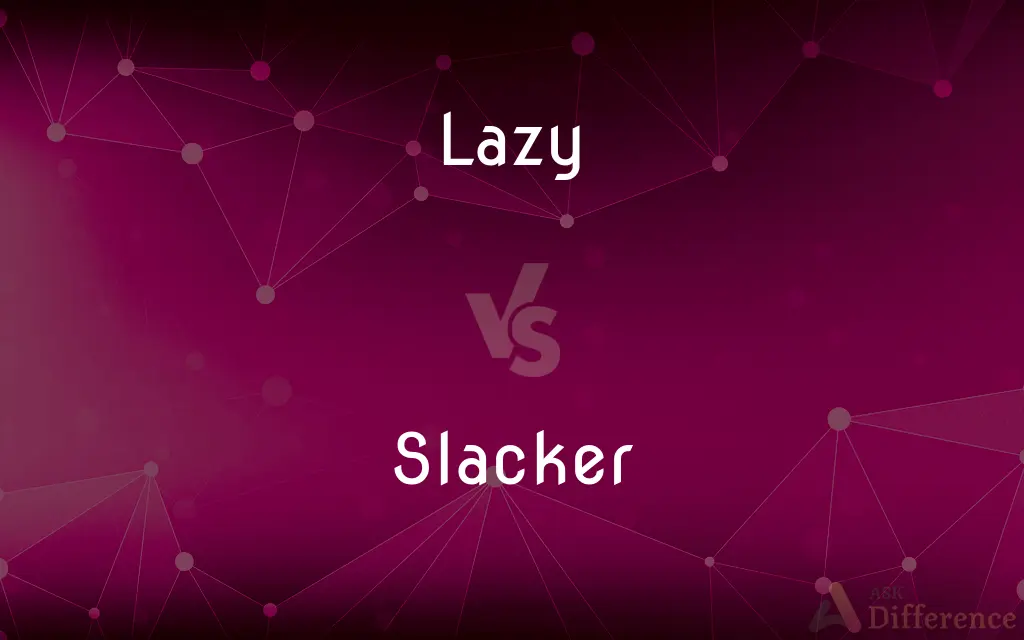Lazy vs. Slacker — What's the Difference?
By Urooj Arif & Fiza Rafique — Updated on March 29, 2024
Lazy refers to a lack of willingness to work or use energy, while slacker denotes someone who avoids work or duties.

Difference Between Lazy and Slacker
Table of Contents
ADVERTISEMENT
Key Differences
Lazy is characterized by a reluctance or aversion to work or exertion, often leading to procrastination and avoidance of tasks. This trait can affect various aspects of one’s life, from personal responsibilities to professional duties, and is typically viewed negatively in cultures that value productivity and industriousness. Slacker, on the other hand, specifically describes a person who consistently avoids work or responsibilities, showing a pattern of behavior rather than a temporary state or mood. Slackers may employ excuses or deceit to escape obligations, and their actions (or lack thereof) can have implications not only for themselves but also for their peers or colleagues who may have to compensate for their lack of contribution.
While lazy can describe a general disposition or temporary state of being uninterested in exertion or effort, it doesn’t necessarily imply a complete avoidance of responsibilities. Someone might be lazy about a particular task or at a specific time but still fulfill their obligations eventually. Conversely, slackers are often perceived as making a lifestyle out of avoiding work or exertion, potentially manipulating situations to their advantage. This distinction points to slackers as having a more ingrained or habitual nature of avoiding duties, whereas laziness might be more situational or temporary.
Lazy behavior can stem from a variety of causes, including lack of motivation, feeling overwhelmed, or prioritizing leisure and relaxation. It’s often viewed as a personal failing or a lack of discipline, but it can also be a symptom of underlying issues like depression or burnout. Slackers, however, are usually seen in a social context, where their actions (or inactions) impact others. Their behavior can create frustration and additional workload for those around them, leading to conflict and resentment in group dynamics, whether in professional settings or personal relationships.
Comparison Chart
Definition
Aversion to work or exertion
Person who avoids work or responsibilities
Perception
Negative, related to personal attitude
Highly negative, seen as a behavioral pattern
ADVERTISEMENT
Context
Can be situational or general
Often habitual, impacting group dynamics
Implications
Seen as personal failing or lack of discipline
Impacts others, leading to conflict and resentment
Underlying Causes
Lack of motivation, feeling overwhelmed, prioritization of leisure
Often viewed as a lifestyle choice, potential manipulation
Compare with Definitions
Lazy
Aversion to activity or exertion.
The lazy afternoon sun made it hard to focus on work.
Slacker
Person who avoids work.
The team project suffered because of a slacker in the group.
Lazy
Lack of enthusiasm.
His lazy response to the emergency alarmed everyone.
Slacker
Neglectful of duties.
The slacker employee was eventually dismissed for not meeting deadlines.
Lazy
Designed for ease.
She appreciated the lazy Susan in the middle of the dining table.
Slacker
Lack of commitment.
Her slacker attitude towards homework frustrated her parents.
Lazy
Neglectful due to dislike of effort.
The garden became overgrown due to his lazy care.
Slacker
Avoids responsibilities.
As a slacker, he often dodged family obligations.
Lazy
Slow-moving or leisurely.
We took a lazy stroll through the park.
Slacker
Minimal effort in tasks.
He did a slacker's job cleaning the kitchen, barely scrubbing the surfaces.
Lazy
Not willing to work or be energetic.
Slacker
A slacker is someone who habitually avoids work or lacks work ethic.
Lazy
Slow-moving; sluggish
A lazy river.
Slacker
One who shirks work or responsibility.
Lazy
Conducive to inactivity or indolence
A lazy summer day.
Slacker
One who tries to evade military service in wartime; a draft dodger.
Lazy
Depicted as reclining or lying on its side. Used of a brand on livestock.
Slacker
One who procrastinates or is lazy.
Lazy
Unwilling to do work or make an effort; disinclined to exertion.
Get out of bed, you lazy lout!
Slacker
A person lacking a sense of direction in life; an underachiever.
Lazy
Causing or characterised by idleness; relaxed or leisurely.
I love staying inside and reading on a lazy Sunday.
Slacker
A member of a certain 1990s subculture associated with Generation X.
Lazy
Showing a lack of effort or care.
Lazy writing
Slacker
A person who seeks to avoid military service.
Lazy
Sluggish; slow-moving.
We strolled along beside a lazy stream.
Slacker
A user of the Slackware Linux distribution.
Lazy
Lax:
Slacker
A person who shirks their work or duty (especially one who tries to evade military service in wartime)
Lazy
Droopy.
A lazy-eared rabbit
Lazy
(optometry) Of an eye, squinting because of a weakness of the eye muscles.
Lazy
Turned so that (the letter) is horizontal instead of vertical.
Lazy
(comptheory) Employing lazy evaluation; not calculating results until they are immediately required.
A lazy algorithm
Lazy
Wicked; vicious.
Lazy
(informal) To laze, act in a lazy manner.
Lazy
A lazy person.
Lazy
(obsolete) Sloth (animal).
Lazy
Disinclined to action or exertion; averse to labor; idle; shirking work.
Lazy
Inactive; slothful; slow; sluggish; as, a lazy stream.
Lazy
Wicked; vicious.
Lazy
Moving slowly and gently;
Up a lazy river
Lazy white clouds
At a lazy pace
Lazy
Disinclined to work or exertion;
Faineant kings under whose rule the country languished
An indolent hanger-on
Too lazy to wash the dishes
Shiftless idle youth
Slothful employees
The unemployed are not necessarily work-shy
Common Curiosities
Can a lazy person be a slacker?
Yes, if their laziness leads them to habitually avoid responsibilities.
Is laziness a choice?
It can be, though sometimes it’s a symptom of underlying issues.
Why is being a slacker frowned upon?
It impacts others by increasing their workload and creating inefficiencies.
What makes someone lazy?
Lack of motivation, feeling overwhelmed, or prioritizing relaxation over work.
How to deal with a slacker in a team?
Clear communication, setting expectations, and possibly reallocating tasks.
Can laziness be positive?
Occasionally, as it can lead to creative problem-solving or necessary rest.
Are there industries where being lazy or a slacker is more tolerated?
Tolerance levels vary, but creative fields may offer more flexibility.
What motivates a slacker?
Avoidance of effort and responsibility, sometimes for leisure or personal interests.
Can technology make people lazier or more of a slacker?
Potentially, by making it easier to avoid tasks or responsibilities.
Can a slacker change their ways?
Yes, with motivation and support to adopt more responsible habits.
How do cultures view laziness and slacking?
Negatively, as they value productivity and contribution.
Can laziness be temporary?
Yes, often influenced by current circumstances or moods.
Do slackers realize their impact on others?
Sometimes, though they may not always care or take responsibility.
How do laziness and slacking affect personal relationships?
They can strain relationships due to unmet expectations and unequal effort.
Is being called lazy or a slacker worse?
Being called a slacker, as it suggests a pattern of avoiding responsibilities.
Share Your Discovery

Previous Comparison
Glitter vs. Sparkle
Next Comparison
Stevia vs. SorbitolAuthor Spotlight
Written by
Urooj ArifUrooj is a skilled content writer at Ask Difference, known for her exceptional ability to simplify complex topics into engaging and informative content. With a passion for research and a flair for clear, concise writing, she consistently delivers articles that resonate with our diverse audience.
Co-written by
Fiza RafiqueFiza Rafique is a skilled content writer at AskDifference.com, where she meticulously refines and enhances written pieces. Drawing from her vast editorial expertise, Fiza ensures clarity, accuracy, and precision in every article. Passionate about language, she continually seeks to elevate the quality of content for readers worldwide.
















































